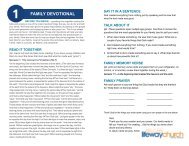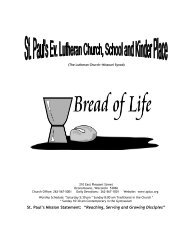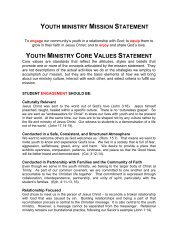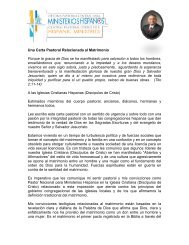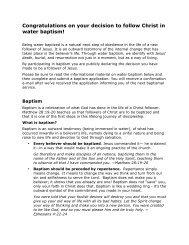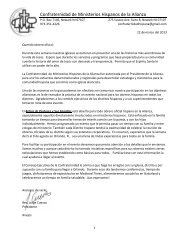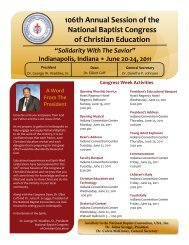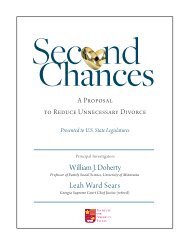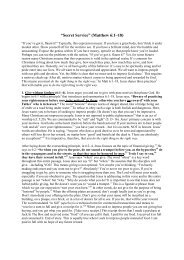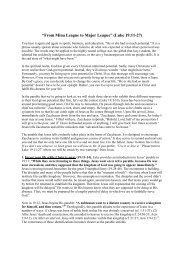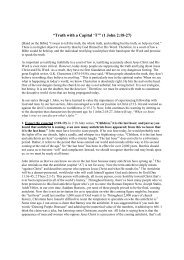“Free to Submit” (1 Peter 2:18-25) - Razorplanet
“Free to Submit” (1 Peter 2:18-25) - Razorplanet
“Free to Submit” (1 Peter 2:18-25) - Razorplanet
You also want an ePaper? Increase the reach of your titles
YUMPU automatically turns print PDFs into web optimized ePapers that Google loves.
<strong>“Free</strong> <strong>to</strong> <strong>Submit”</strong> (1 <strong>Peter</strong> 2:<strong>18</strong>-<strong>25</strong>)<br />
Do you feel appreciated in your work? Do you sense that you are valued and respected? Does your boss<br />
place unrealistic demands upon you? Is your boss moody and easily agitated? Does he/she criticize you<br />
on a regular basis? Do you feel rejected or even persecuted by your co-workers? If so, this sermon is for<br />
you. Children and teens, do you have parents that never say, “good job,” no matter how hard you try? If<br />
so, this sermon is for you. Parents, do you have children who never say, “thank you,” for hundreds of<br />
rides, meals, and launderings? If so, this sermon is for you. Husbands and wives, are you married <strong>to</strong> a<br />
spouse who long ago s<strong>to</strong>pped saying, “I love you. Thanks for all you do.” If so, this sermon is for you.<br />
At one time or another, most people feel underpaid and unappreciated. We are tempted <strong>to</strong> think or say,<br />
“What did I do <strong>to</strong> deserve this treatment? The people at my work have no idea how fortunate they are that<br />
I’m here.” We tend <strong>to</strong> think that we don’t deserve <strong>to</strong> be treated poorly. Somehow we think we’re above it.<br />
The message of the Bible is contrary <strong>to</strong> this mentality. This is especially clear in the book of 1 <strong>Peter</strong>. The<br />
book of 1 <strong>Peter</strong> is about suffering and <strong>Peter</strong> is going <strong>to</strong> argue that we must submit amidst unjust<br />
suffering. In chapter 2, <strong>Peter</strong> urges his readers <strong>to</strong> cultivate a love for God’s Word (2:1-3) and <strong>to</strong> live like<br />
God’s people (2:4-12). In 2:11-12, he expressly states that excellent living earns the right <strong>to</strong> be heard.<br />
Then in 2:13-3:6, <strong>Peter</strong> expounds the virtue of submission, applying this theme <strong>to</strong> citizens (2:13-17),<br />
servants (2:<strong>18</strong>-<strong>25</strong>), and wives (3:1-6). 1 <strong>Peter</strong> specifically mentions citizenship, work, and marriage<br />
because these are three primary areas where most suffering occurs.<br />
In 2:<strong>18</strong>, <strong>Peter</strong> writes, “Servants, be submissive <strong>to</strong> your masters with all respect, not only <strong>to</strong> those who<br />
are good and gentle, but also <strong>to</strong> those who are unreasonable.” <strong>Peter</strong> tells “servants” 2 <strong>to</strong> be<br />
“submissive” 3 <strong>to</strong> their masters (cf. 2:13). Yet, unlike “submission holds” in wrestling or martial arts,<br />
biblical submission is voluntary. As disciples we are called <strong>to</strong> make deliberate decisions on a daily basis<br />
<strong>to</strong> submit. <strong>Peter</strong> goes on <strong>to</strong> write that we are <strong>to</strong> be submissive “with all respect” (lit. “with all fear”). This<br />
phrase refers <strong>to</strong> our responsibility <strong>to</strong> fear God (see 1:17; 2:17; Col 3:22). 4 <strong>Peter</strong> is saying, “Servants,<br />
submit <strong>to</strong> your earthly master because you fear God.” 5<br />
The <strong>to</strong>ugh thing is <strong>Peter</strong> says it doesn’t matter if our master is “good and gentle” or “unreasonable.”<br />
The term rendered “unreasonable” (skolios) means “crooked.” 6 The English word “scoliosis” is derived<br />
from this Greek word. (Scoliosis is the disease of a dis<strong>to</strong>rted spine.) <strong>Peter</strong> is saying that even though our<br />
employers can be morally dishonest and evil the Lord still expects us <strong>to</strong> recognize the place of authority<br />
that He has put them in (see Rom 13:1). Since we live in a “perverse/corrupt generation” (Acts 2:40) we<br />
can expect employers <strong>to</strong> be crooked in terms of pay, work conditions, expectations, etc. Yet, even in the<br />
case of unjust suffering, we are still <strong>to</strong> “keep our behavior excellent among the Gentiles” (2:12). Our<br />
responsibility at the end of the day is for our actions and not those of others. They will give an account of<br />
their behavior <strong>to</strong> God (4:5) and judgment belongs <strong>to</strong> Him (2:23).<br />
So how can we demonstrate biblical submissiveness? (1) Have a teachable, rather than a defensive, spirit<br />
when being corrected or instructed. A Dennis the Menace car<strong>to</strong>on shows Dennis being disciplined and<br />
sitting on his rocking chair in the corner: “I’m sitting down on the outside, but I’m still standing up on the<br />
inside.” This is not the heart of a disciple. We have a responsibility <strong>to</strong> be humble and gracious. We are <strong>to</strong><br />
stand out from the rest of our fellow employees because we’ve changed bosses—we’re working for<br />
Christ.<br />
(2) Don’t complain about your boss or put him down behind his back when others are doing it all the<br />
time. FOX television is debuting a new reality TV show called, My Big Fat Obnoxious Boss. 7 This is<br />
typical of the type of remarks that we can hear in work environments. “My boss is obnoxious.” “She is<br />
such a jerk.” “He is so selfish.” Instead, speak words that build up.
(3) Obey the instructions of your boss. 8 You don’t have <strong>to</strong> agree with the validity of his/her instructions in<br />
order <strong>to</strong> faithfully carry them out. If you have ever been in the armed forces you understand this. As a<br />
soldier you must obey all the orders whether you agree with them or not. This rule also applies at work.<br />
Even if you don’t agree with the course of action or work responsibility, do it nonetheless. Then work<br />
diligently and faithfully all the time, not just when the boss is watching.<br />
(4) Pray that God would prosper your boss (spiritually, emotionally, relationally, and financially). A great<br />
example of this is found in the movie, Scrooge. Bob Cratchet prays, “God bless us everyone…even Mr.<br />
Scrooge.”<br />
(5) Show him respect in your <strong>to</strong>ne of voice, body language, etc. Our society dictates a lack of respect for<br />
authority figures. You can be counter-cultural by loving your boss with the love of Christ.<br />
<strong>Peter</strong> is clear that we are <strong>to</strong> submit but the natural question is: Why should we bother submitting <strong>to</strong> those<br />
who disrespect and abuse us? <strong>Peter</strong> answers the question with three powerful incentives. (1) The first<br />
incentive is found in 2:19: God’s favor. <strong>Peter</strong> writes, “For this finds favor, if for the sake of<br />
conscience <strong>to</strong>ward God a person bears up under sorrows 9 when suffering 10 unjustly.” The word<br />
“for” indicates that <strong>Peter</strong> is giving an explanation/motivation for submitting <strong>to</strong> our masters. The reason<br />
given is that submission “finds favor.” The word “favor” (charis) is the Greek word for “grace.” 11 I<br />
think what <strong>Peter</strong> means here is that God delights in behavior that reflects utter reliance on His grace.<br />
When a Christian, out of “conscience 12 <strong>to</strong>ward God” or “mindful of God” (ESV), looks <strong>to</strong> God for<br />
strength, courage, hope, and peace in a time of suffering, God sees it as a tribute <strong>to</strong> His grace. God is<br />
shown in it. And when God is shown God is pleased. 13<br />
<strong>Peter</strong> further explains his thought in 2:20a: “For what credit is there if, when you sin and are harshly<br />
treated, 14 you endure it with patience?” <strong>Peter</strong> is saying, “If you steal pens from the office and get in<br />
trouble, what credit is there?” “If you take a long lunch break and get busted, what credit is there?” “If<br />
you exchange words with your boss and he writes you up, what credit is there?” “If you get fired for<br />
viewing Internet pornography, what credit is there?” The answer <strong>to</strong> all of these scenarios is there is no<br />
credit…none! You deserve <strong>to</strong> be “harshly treated” for all these things. If you endure your punishment<br />
with patience, big deal! Who cares? You’re just receiving your just due.<br />
One of the most important questions a Christian worker can ask is: Why am I suffering? Is my work not<br />
up <strong>to</strong> snuff? Am I routinely late for work? Do I meddle? Do I talk <strong>to</strong>o much? Am I strong-willed and<br />
argumentative? Do I share my faith when I should be working? In many cases there are good reasons why<br />
Christians suffer. Before you claim <strong>to</strong> be suffering unjustly be sure that you are not guilty of bringing on<br />
the suffering.<br />
<strong>Peter</strong> now brings a word of contrast, “But if when you do what is right and suffer for it you patiently<br />
endure it, this finds favor with God” 15 (2:20b). Please let this sink in! When you do right you will<br />
suffer. When you do right you will be criticized. When you do right things won’t necessarily get better.<br />
When you do right someone will say a hurtful thing. When you do right people will not even notice and<br />
there will be no appreciation. 16 Yet, <strong>Peter</strong> says, “If you ‘patiently endure’ 17 unjust suffering you will find<br />
favor with God.”<br />
When I first began lifting weights in seventh grade, I was so physically weak that I lifted by myself, in the<br />
privacy of my bedroom. One day I was working out with my 110-pound weight set. I was doing a set of<br />
squats. Since I had no bench, I had <strong>to</strong> take the barbell and clean and press it <strong>to</strong> my shoulders. Once I did<br />
that I would do my set. On my final set of squats I was feeling weary but I knew I could finish my reps.<br />
Well, wouldn’t you know it, my legs gave out. I then fell face forward on<strong>to</strong> my bed with a 110-pound<br />
barbell on my neck. What’s a young man <strong>to</strong> do when something like this happens? The answer is obvious:
“HELP!!” I yelled and screamed but no one came <strong>to</strong> my rescue. I later learned that I was home alone. I<br />
had <strong>to</strong> patiently endure a lengthy struggle <strong>to</strong> get this weight off my neck. After a few minutes that seemed<br />
like hours I was able <strong>to</strong> tilt one side of the weight on its side and escape with my life.<br />
This humorous crisis demonstrates the importance of bearing up, patient endurance. One who suffers<br />
righteously must persevere in his suffering. Many can endure for a short period of time but <strong>Peter</strong> calls you<br />
and me <strong>to</strong> endure our suffering with patience. When we do so we find “favor” or “grace” with God. Is<br />
there anything that means more <strong>to</strong> you than God’s approval? (2:<strong>18</strong>-19). I hope not. God wants you <strong>to</strong> seek<br />
after His “well done” (Matt <strong>25</strong>:21, 23).<br />
[We are called <strong>to</strong> submit amidst unjust suffering because of God’s grace.]<br />
(2) In 2:21a, <strong>Peter</strong> provides the second incentive for suffering unjustly: the Christian’s calling. <strong>18</strong><br />
<strong>Peter</strong> writes, “For you have been called for this purpose.” Here we see that undeserved suffering is not<br />
a possibility for our lives but it is a promise. Part of the Christian’s calling (1:1; 2:9) includes suffering<br />
(cf. 2 Tim 3:12). 19 Of course this leads <strong>to</strong> a natural question: Why do we have <strong>to</strong> suffer? A skeptic once<br />
asked C.S. Lewis this very question, “Why are the righteous called <strong>to</strong> suffer?” Lewis replied, “Why not?<br />
They’re the only ones who can take it.” The reality is there are times when God wills the unjust suffering<br />
of His people. Elsewhere <strong>Peter</strong> writes, “For it is better, if God should will it so, that you suffer for doing<br />
what is right rather than for doing what is wrong” (3:17). “Therefore, those also who suffer according <strong>to</strong><br />
the will of God shall entrust their souls <strong>to</strong> a faithful Crea<strong>to</strong>r in doing what is right” (4:19). God often wills<br />
our suffering because He knows the best way for us <strong>to</strong> bring Him glory. Sometimes it is by miraculously<br />
escaping suffering and sometimes (more often) by graciously bearing suffering that we do not deserve,<br />
from men, because we trust in God.<br />
There is an Arab proverb which says, “All sunshine makes a desert.” Just as the rain is necessary for<br />
plants <strong>to</strong> grow, unjust suffering is just as necessary for us <strong>to</strong> grow in godliness. A similar truth is found in<br />
tea [display a tea bag]. Do you like tea? Well, here’s a tea bag. Go ahead and eat it. Of course you<br />
wouldn’t do that. Why? Because you know that the tea bag must first go through hot water. A Christian is<br />
like a tea bag—not much good until it has gone through hot water. 20 Are you willing <strong>to</strong> step up <strong>to</strong> your<br />
calling? Will you patiently endure in your work responsibilities because you’re a follower of Christ?<br />
[We are called <strong>to</strong> submit amidst unjust suffering because of God’s grace and our Christian calling.]<br />
(3) The third incentive that <strong>Peter</strong> mentions is: Christ’s example (2:21b-<strong>25</strong>). 21 Undeserved suffering<br />
was a critical component in God’s plan for Christ’s life (cf. Heb 2:10; 5:8). 22 This is especially brought<br />
out in 2:21b: “Since Christ also suffered for you, leaving you an example for you <strong>to</strong> follow in His<br />
steps.” 23 <strong>Peter</strong> writes that Christ suffered for “you.” He voluntarily stepped in<strong>to</strong> a position where there<br />
would inevitably be much suffering. He <strong>to</strong>ok the form of a servant, subjecting Himself <strong>to</strong> the will of His<br />
Father, enduring everything that was necessary for Him <strong>to</strong> save the human race.<br />
<strong>Peter</strong> heightens his argument by bringing up Christ as our example. The word “example” (hupogrammos)<br />
appears only here in the New Testament. However, in classical Greek the word meant “underwriting.” It<br />
referred <strong>to</strong> a drawing that someone placed under another sheet of paper so he or she could trace on the<br />
upper sheet. Children often learn the alphabet by copying a sheet provided by their teacher. To get it<br />
exactly right they use tracing paper and produce an example from the original work. In the same way,<br />
Jesus has given us a pattern <strong>to</strong> follow. <strong>Peter</strong> says that this “example” is for us “<strong>to</strong> follow in His steps.”<br />
The word “follow” provides an additional way of looking at this verse. People and animals often leave<br />
their mark when traveling through mud or snow. We can track them by following their footprints. In the<br />
same way, Jesus has gone before us and we can plant our shoes where He has already been (Heb 4:14-<br />
16).
In 2:22-23, 24 <strong>Peter</strong> draws upon five experiences from Jesus’ life. (1) Jesus was sinless (“who committed<br />
no sin”). One of the amazing truths of this passage is: Christ was absolutely sinless <strong>25</strong> and yet He suffered<br />
willingly on our behalf. 26 This is quite a statement. <strong>Peter</strong> had lived with Jesus for more than three years<br />
and had observed Him closely, yet he could say that Jesus never sinned (see also 1:19). He had seen Him<br />
tired and tempted, misunders<strong>to</strong>od, and misrepresented. Yet, Jesus never did or said anything that was in<br />
the least way inappropriate. Both His inner life and external conduct were absolutely without sin. 27 While<br />
we can’t be sinless in this life, we can seek <strong>to</strong> emulate the life of Christ so that there is an unmistakable<br />
innocence about us.<br />
(2) Jesus was honest (“nor was any deceit found in His mouth”). Jesus was upright in all that He said.<br />
When someone is causing us suffering we may be tempted <strong>to</strong> lie or deceive in order <strong>to</strong> escape that<br />
suffering (e.g., Abraham [Gen 12:11-13] and <strong>Peter</strong> [Matt 26:69-74]). Yet the life of Christ challenges us<br />
<strong>to</strong> live above our natural inclinations.<br />
(3) Jesus was gracious (“while being reviled, He did not revile in return”). The word “revile” means<br />
“<strong>to</strong> heap abuse on someone.” <strong>Peter</strong> is referring specifically <strong>to</strong> Jesus’ sufferings when He was on trial and<br />
during His crucifixion. 28 Jesus did not fight fire with fire. He could easily have retaliated and overthrown<br />
His persecu<strong>to</strong>rs. Instead He trusted God <strong>to</strong> deal with His persecu<strong>to</strong>rs justly, as we should. In our everyday<br />
experience insults are often met with a dose of the same medicine (3:9) and if this does not work,<br />
vengeance at a later time is plotted. This should not be.<br />
(4) Jesus was humble (“while suffering, He uttered no threats”). The religious leaders of Judaism<br />
hurled their insults at Him by placing a blindfold over His eyes, spitting at Him, and striking Him with<br />
their fists while taunting Him <strong>to</strong> “prophesy!” (Mark 14:65; 15:31-32). The Roman soldiers crowned Him<br />
with thorns and mocked Him as king (Mark 15:17-20). Even those passing by the cross in the time of His<br />
agony reviled Him (Mark 15:29-30). How did He respond? With dignified silence. He did not retaliate<br />
(Mark 14:61; 15:5; Luke 23:9). His cause was just; His suffering was unjust. Even His <strong>to</strong>rmen<strong>to</strong>rs were<br />
included within the circle of His forgiveness: “Father, forgive them; for they do not know what they are<br />
doing” (Luke 23:34). 29 Jesus did not threaten anyone. He could have said, “One day I’ll be the judge and<br />
you will be on trial; you will be sent <strong>to</strong> hell!” Often our threats are empty; we cannot follow through with<br />
them. However, Jesus could have followed through, yet He chose not <strong>to</strong>.<br />
(5) Jesus was dependent (“kept entrusting Himself <strong>to</strong> Him who judges righteously”). Instead of<br />
focusing on His enemies Jesus looked <strong>to</strong> His Father. The word “Himself” is in italics which means it is<br />
not in the original Greek. What <strong>Peter</strong> seems <strong>to</strong> be saying is: Jesus handed over <strong>to</strong> God the whole situation,<br />
including Himself and those abusing Him, and the hurt done and all the fac<strong>to</strong>rs that made His trial and<br />
crucifixion a horrendous outrage of injustice. He trusted everything in<strong>to</strong> God’s hands as the One who<br />
would settle the matter justly someday (cf. 1:17). He said, “I will not carry the burden of revenge; I will<br />
not carry the burden of sorting out motives; I will not carry the burden of self-pity; I will not carry the<br />
burden of bitterness; I will hand everything over <strong>to</strong> God who will settle it all in a perfectly just way.”<br />
Notice that <strong>Peter</strong> does not recommend venting our anger when wronged or burying it inside of us. We are<br />
<strong>to</strong> give ourselves repeatedly in<strong>to</strong> God’s hands. After all, He can handle it when we express our real<br />
feelings. We shouldn’t call a friend <strong>to</strong> vent. Rather, we should “keep entrusting ourselves <strong>to</strong> Him.” This is<br />
your calling this morning. It’s not merely a rule <strong>to</strong> be followed. It’s a miracle <strong>to</strong> be experienced, a grace <strong>to</strong><br />
be received. It’s a promise <strong>to</strong> be believed. Do you believe that God sees every wrong done <strong>to</strong> you, that He<br />
knows every hurt, that He assesses motives and circumstances with perfect accuracy, that He is<br />
impeccably righteous and takes no bribes, and that He will settle all accounts with perfect justice? If you<br />
believe this—if God is this real <strong>to</strong> you—then you will hand it over <strong>to</strong> God, and though nobody in the<br />
world may understand where your peace and joy and freedom <strong>to</strong> love is coming from, you know. The<br />
answer is God. And sooner or later they will know.
In 2:24, <strong>Peter</strong> transitions <strong>to</strong> talk specifically about Christ’s sufferings for us. He writes, “…and He<br />
Himself bore 30 our sins 31 in His body on the cross, 32 so that we might die 33 <strong>to</strong> sin and live <strong>to</strong><br />
righteousness; for by His wounds 34 you were healed.” 35 Jesus’ sufferings reached their climax on the<br />
cross. <strong>Peter</strong> taught that Jesus paid the penalty for our sins and laid down His life as payment for those<br />
sins. The verse says that “He Himself bore our sins in His body on the cross.” Jesus Christ died on the<br />
cross for our sins. This means that God can’t forgive you solely on the basis of His love. Someone had <strong>to</strong><br />
die <strong>to</strong> appease His wrath <strong>to</strong>ward sin. Jesus died so that you might live. The purpose of Christ’s death was<br />
“so that we might die <strong>to</strong> sin and live <strong>to</strong> righteousness.” The overarching purpose of Christ’s death was<br />
not merely <strong>to</strong> get men and women <strong>to</strong> heaven but <strong>to</strong> empower those same men and women <strong>to</strong> live<br />
vic<strong>to</strong>rious Christian lives here on earth. By means of Christ’s death on the cross whoever comes <strong>to</strong> Him<br />
ends his old life and begins a new one, devoted <strong>to</strong> righteousness or “right living” (cf. Rom 6:1-14, <strong>18</strong>-19;<br />
2 Cor 5:14-15; Gal 2:20; 6:14).<br />
In 2:24, we see a basic principle for undeserved suffering: Christ was hurt in order that we might be<br />
healed. Suffering in our lives always has purpose behind it and often its purpose is that God wants others<br />
around us <strong>to</strong> see a supernatural response <strong>to</strong> undeserved affliction. Augustine once said, “When God<br />
allows us <strong>to</strong> suffer it is either <strong>to</strong> improve our imperfections or <strong>to</strong> prove our perfections.” As we respond in<br />
a godly manner <strong>to</strong> undeserved suffering, that response becomes a blinking light which sets us apart in this<br />
darkened world. And we <strong>to</strong>o can be hurt in order that others might be healed. 36<br />
In 2:<strong>25</strong>, <strong>Peter</strong> writes, “For you were continually straying like sheep, but now you have returned <strong>to</strong><br />
the Shepherd and Guardian of your souls.” God chose, of all animals in creation, <strong>to</strong> call human beings<br />
“sheep.” 37 He could have compared us <strong>to</strong> strong oxen or noble horses or even cute kittens; but He<br />
preferred <strong>to</strong> call us sheep. Sheep have a built-in waywardness, a remarkable capacity for going wrong.<br />
When left <strong>to</strong> their own devices sheep will foul things up. 38 But the good news is we have a relationship<br />
with Christ, we have trusted Him for salvation, and we have returned <strong>to</strong> Him as our “Shepherd and<br />
Guardian.” This final verse is a powerful incentive <strong>to</strong> honor God in the marketplace. As we remind<br />
ourselves of our utter sinfulness and how we previously, “continually strayed,” it is much easier <strong>to</strong><br />
“endure” (2:20) unjust suffering from sinful, unbelieving men.<br />
The titles “the Shepherd 39 and Guardian of your soul[s]”means “overseer,” implying that not only<br />
does Christ save us, but He sovereignly preserves and protects us as He sees fit. Whatever your trials and<br />
burdens you have “the Shepherd and Guardian of your soul[s].” The double designation assures us of<br />
Christ’s own care for His own. He not only leads, feeds, and sustains His own but also guides, directs,<br />
and protects them. 40 As a shepherd He feeds His people; as a guardian He keeps His people. Will you<br />
entrust yourself <strong>to</strong> this Shepherd and Guardian? Will you begin <strong>to</strong> submit amidst unjust suffering because<br />
of God’s grace, your calling, and His example?<br />
Invitation: Let’s face it; this world can be difficult at best. You need <strong>to</strong> be loved and appreciated. I do <strong>to</strong>o.<br />
Ultimately, there is only one that can meet our needs for fulfillment and approval. He wants <strong>to</strong> have a<br />
relationship with you <strong>to</strong>day.<br />
Copyright © 2004 Keith R. Krell. All rights reserved. All Scripture quotations, unless indicated, are taken from the New American Standard<br />
Bible, © 1960, 1962, 1963, 1968, 1971, 1972, 1975, 1977, and 1995 by The Lockman Foundation, and are used by permission.<br />
Permissions: Feel free <strong>to</strong> reproduce and distribute any articles written by Keith Krell, in part or in whole, in any format, provided that you do not<br />
alter the wording in any way or charge a fee beyond the cost of reproduction. It is our desire <strong>to</strong> spread this information, not protect or restrict it.<br />
Please include the following statement on any distributed copy: by Keith Krell, Timeless Word Ministries, <strong>25</strong>08 State Ave NE Olympia, WA<br />
98506, 360-352-9044, www.timelessword.com
Notes<br />
1 See Michael Ea<strong>to</strong>n, Preaching Through the Bible: 1 <strong>Peter</strong> (Great Britain, Sovereign World, 1999), 54.<br />
2 Gk. oiketai refers <strong>to</strong> “house slaves.” See also Luke 16:13; Acts 10:7; and Rom 14:4.<br />
3 Gk. hupotasso, cf. 1 Pet 2:13, 3:1, 5, 22; and 5:5. While hupotassomenoi (“be submissive”) is a participle and not<br />
an imperative, it does have imperatival force because it links back with hupotagete (“submit yourselves”) in 2:13.<br />
Both the imperative (2:13) and participle (2:<strong>18</strong>) are derived from the exhortation of 2:11-12.<br />
4 Davids correctly argues, “(1) The phrase with all respect” comes before the reference <strong>to</strong> the masters in the Greek<br />
word order, and (2) fear or reverence (Gk. phobos) in 1 <strong>Peter</strong> is always directed <strong>to</strong>ward God, never <strong>to</strong>ward people,<br />
whom Christians are not <strong>to</strong> fear (1:17; 2:17; 3:2, 6, 14, 16).” See <strong>Peter</strong> H. Davids, The Book of 1 <strong>Peter</strong>: NICNT<br />
(Grand Rapids: Eerdmans, 1987), 106. See also I. Howard Marshall, 1 <strong>Peter</strong> (Downers Grove: IL: InterVarsity,<br />
1990), 87.<br />
5 This would parallel 1 Pet 2:13: “Submit yourselves for the Lord’s sake <strong>to</strong> every human institution.” Of course,<br />
believers do not have <strong>to</strong> submit when authorities ask us <strong>to</strong> sin (Acts 5:29).<br />
6 Gk. skolios “pertains <strong>to</strong> being morally bent or twisted, crooked, unscrupulous, dishonest.” See BDAG, Electronic<br />
Ed (cf. Acts 2:40; and Phil 2:15). It is also translated “unjust” (ESV) or “harsh” (NIV).<br />
7 This show is scheduled <strong>to</strong> air Nov 7 th , 2004. For more information see http://www.fox.com/bigfat/.<br />
8 What <strong>Peter</strong> cannot be saying is that we are <strong>to</strong> passively “lie down” under every bad experience at work. In cases of<br />
grievance, companies usually have procedures <strong>to</strong> follow. There may be legal protection for unfair dismissal or<br />
sexual harassment. These exist for Christians <strong>to</strong>o!<br />
9 Gk. lupas. Grudem notes, “[Sorrows] is used of mental pain or grief, sorrow, but never in the New Testament is the<br />
noun [sixteen occurrences] or the verb [twenty-six occurrences] used of physical pain itself.” See Wayne Grudem,<br />
Tyndale New Testament Commentaries: 1 <strong>Peter</strong> (Grand Rapids: Eerdmans, 1988), 126.<br />
10 The actual verb meaning “suffer” (pascho) appears for the first time in 1 <strong>Peter</strong> 2:19 and recurs in 2:20, 21, 23;<br />
3:14, 17, <strong>18</strong>; 4:1 [twice], 15, 19; 5:10. Twelve of the 41 NT occurrences of the verb come in this brief letter,<br />
<strong>to</strong>gether with four of 16 occurrences of the noun form (1:11; 4:13; 5:1, 9). These figures indicate clearly that<br />
suffering is a major theme in 1 <strong>Peter</strong>. See also Marshall, 1 <strong>Peter</strong>, 89.<br />
11 The ESV renders this phrase, “For this is a gracious thing.”<br />
12 Cf. 1 <strong>Peter</strong> 3:16 and 21.<br />
13 See also John Piper, How <strong>to</strong> suffer for doing what is right (1 <strong>Peter</strong> 2:<strong>18</strong>-23), June 5, 1994:<br />
http://www.soundofgrace.com/piper94/06-05-94.htm%20&SermonID=23698.<br />
14 The phrase “harshly treated” (kolaphizomerloi, lit. “strike with the fist”) is used in Mark 14:65 of Christ’s<br />
treatment at His trial.<br />
15 Behind Jesus’ words we can hear the teaching of Jesus in Luke 6:32-35, “If you love those who love you, what<br />
credit is that <strong>to</strong> you? For even sinners love those who love them…”<br />
16 John Piper, He trusted <strong>to</strong> Him who judges justly (1 <strong>Peter</strong> 2:<strong>18</strong>-<strong>25</strong>), August <strong>25</strong>, 1991:<br />
http://www.soundofgrace.com/piper91/08-<strong>25</strong>-91.htm&SermonID=23702.<br />
17 Gk. hupomeno: “<strong>to</strong> maintain a belief or course of action in the face of opposition, stand one’s ground, hold out,<br />
and endure.” See also Matt 10:22; 24:13; Mark 13:13; Rom 12:12; 8:24; 1 Cor 13:7; 2 Tim 2:10, 12; Heb 10:32;<br />
12:2-3, 7; Jas 1:12; 5:11, BDAG Electronic Ed.<br />
<strong>18</strong> Elsewhere <strong>Peter</strong> states that believers are called out of darkness in<strong>to</strong> God’s marvelous light, called <strong>to</strong> inherit a<br />
blessing, and called <strong>to</strong> God’s eternal glory in Christ (1 Pet 2:9; 3:9; 5:10).<br />
19 See Dr. Thomas L. Constable, Notes on 1 <strong>Peter</strong> (http://www.soniclight.com/constable/notes/pdf/1peter.pdf ,<br />
2003), 33.<br />
20 See Michael P. Green, Illustrations for Biblical Preaching (Grand Rapids: Baker, 1989), Electronic Ed.<br />
21 Hiebert writes, “These verses [2:21-<strong>25</strong>] contain the fullest elaboration of the example of Jesus Christ for believers<br />
in the New Testament.” D. Edmond Hiebert, “Following Christ’s Example: An Exposition of 1 <strong>Peter</strong> 2:21-<strong>25</strong>,”<br />
Bibliotheca Sacra 139:553 (January-March 1982), 32.<br />
22 Dwight Edwards, The Life that Lasts: A verse-by-verse study through 1 <strong>Peter</strong> (www.bible.org), 15-16.<br />
23 Charles Sheldon’s book, In His Steps is based on this verse. I have heard it said that the most read book apart from<br />
the Bible is John Bunyan’s Pilgrim’s Progress. Second, is Sheldon’s book, In His Steps.<br />
24 Five times in 1 <strong>Peter</strong> 2:22-<strong>25</strong>, <strong>Peter</strong> quotes from or makes allusions <strong>to</strong> Isa 53.<br />
<strong>25</strong> See also Matt 27:4; John 8:29, 46; 14:30; <strong>18</strong>:38; 2 Cor 5:21; Heb 4:15; 7:26; 1 John 3:5.<br />
26 In the s<strong>to</strong>ry of Job, after the account of his very great suffering, we are <strong>to</strong>ld, “Through all this Job did not sin nor<br />
did he blame God” (Job 1:22).<br />
27 See also Robert Mounce, A Living Hope (Grand Rapids: Eerdmans, 1982), 36.
28 During the course of His ministry, Jesus’ enemies said He was possessed with a devil. They called Him a<br />
Samaritan, a glut<strong>to</strong>n, a wine-bibber, a blasphemer, a demoniac, one in leaguer with Beelzebub, a perverter of the<br />
nation, and a deceiver of the people. Yet, He did not revile in return.<br />
29 Mounce, A Living Hope, 37.<br />
30 Gk. anenegken means, “<strong>to</strong> offer as a sacrifice, offer up” (see esp. Heb 7:27; 13:5; Jas 2:21; 1 Pet 2:5), BDAG<br />
Electronic Ed. In the Greek OT, it is used for bringing a sacrifice and laying it upon the altar (Gen 8:20; Lev 14:20;<br />
17:5; 2 Chron 35:16).<br />
31 The words “our sins” (hamartias humon) are near the beginning of the verse for emphasis.<br />
32 Gk. xulon (lit. “tree”). Why does <strong>Peter</strong> call the cross a “tree”? Through the ages people have made public<br />
spectacles out of the executions of criminals. Often their bodies were displayed on wooden gallows, poles, or even<br />
trees. The OT speaks of this shame, which hints at Christ’s death on the cross: Anyone who is hung on a tree is<br />
under God’s curse (Deut 21:22-23; Josh 8:29; 10:28; 2 Sam 4:12; 17:23; <strong>18</strong>:10). The executed criminal bears his<br />
own condemnation or curse; Jesus takes our condemnation (cf. Acts 5:30; 10:39; 13:29; Gal 3:13).<br />
33 Gk. apoginomai is only used here in the NT.<br />
34 “Wounds” (molopi) refers <strong>to</strong> the bruising and swelling left by a blow that a fist or whip delivered. Undoubtedly,<br />
some of <strong>Peter</strong>’s original readers had received wounds in a similar fashion or were in danger of receiving them.<br />
35 Tragically, there are those who understand the phrase, “for by His wounds you were healed,” <strong>to</strong> refer <strong>to</strong> the<br />
physical healing of every Christian. But contextually, this cannot be the case because these final two verses are<br />
addressing spiritual deliverance (salvation), not physical deliverance (healing). The context of Isaiah 53 as well as<br />
the past tense completed action verb “were healed” is an already, once for all, accomplished fact. The word<br />
translated “were healed” (iathete) implies spiritual healing from the fatal effects of sin rather than healing from<br />
present physical afflictions. <strong>Peter</strong> used healing as a metaphor for spiritual conversion, as Isaiah did (cf. Mark 2:17;<br />
Luke 4:23).<br />
36 Edwards, The Life that Lasts, 16.<br />
37 The picture of the shepherd and sheep would mean much <strong>to</strong> <strong>Peter</strong>, since he had heard Jesus teach about the Good<br />
Shepherd (John 10) and since Christ had commanded him <strong>to</strong> tend His sheep (John 21). In this passage and others,<br />
the lost sinner is a straying sheep (Isa 53:6; Luke 15:3-7); but Christ, the Shepherd, seeks him out and saves him<br />
(Luke 19:10).<br />
38 See D. Stuart Briscoe, When the Going Gets Tough (Ventura, CA: Regal, 1982), 128.<br />
39 <strong>Peter</strong> calls Jesus “the Chief Shepherd” in 1 <strong>Peter</strong> 5:4. Kennedy lists 14 different functions of a pas<strong>to</strong>ral/shepherd:<br />
(1) Feed, rescue, give sympathetic care, and protect (Isaiah 40). (2) Gather <strong>to</strong>gether and watch the sheep, so they do<br />
not become scattered, confused, and lost (Jeremiah 31:10). (3) Feed, strengthen, heal, search for, rescue, protect<br />
(Ezekiel 34). (4) Lead and protect, so they do not wander and suffer (Zechariah 10:2). (5) Authoritatively lead and<br />
protect (Isaiah 44:28). (6) Lead, feed, refresh, encourage, calm, protect, and comfort (Psalm 23). (7) Have<br />
compassion for those who had no shepherd, teach them (Matthew 9:36; Mark 6:34). (8) Prevent them from<br />
scattering, because without a shepherd sheep scatter (Mark 14:27). (9) Feed and tend, i.e., teach and care for (John<br />
21:15–17). (10) Guard from false teachers, oversee, and shepherd the flock (Acts 20:28). (11) Equip for normal life<br />
and service (Ephesians 4:12). (12) Lead, teach, and be examples of the faithful life (Hebrews 13:7). (13) Lead and<br />
use authority wisely; closely guard and build up the spiritual life of each member of the flock—and do so joyfully<br />
(Hebrews 13:17). (14) Oversee and shepherd willingly and eagerly, not for corrupt gain, and not as heavy-handed<br />
and proud dicta<strong>to</strong>rs, but as examples of how Christ shepherds believers. Christ will give each diligent and faithful<br />
shepherd an unfading crown of glory (1 <strong>Peter</strong> 5:1–4). See Tod Kennedy, “The Shepherding Aspect of the Pas<strong>to</strong>ring<br />
and Teaching Ministry,” Chafer Theological Journal 9 (Fall 2003), 44.<br />
40 See D. Edmond Hiebert, 1 <strong>Peter</strong> (Chicago: Moody, 1992), 190.
Application Study Questions<br />
1. What type of boss was Laban (Gen 31:36-42)? How did he mistreat Jacob? How did Jacob respond? How<br />
would you have responded? Have you ever had an unethical boss (2:<strong>18</strong>)? How did you handle this situation?<br />
How would you handle it differently <strong>to</strong>day?<br />
2. What does the New Testament say about suffering (2:20)? Read John 15:<strong>18</strong>-20; 16:33; Acts 14:22; 1<br />
Thessalonians 3:3; 2 Timothy 3:12. What is the result of endurance during trials and suffering? Read 1 <strong>Peter</strong><br />
1:6-7; 4:13-19; James 1:2-4; Luke 24:26; Philippians 3:10; Hebrews 2:10; 12:2-4.<br />
3. What purpose have we been called for (2:21)? When have you been unjustly treated? What evidence do your<br />
non-Christian work associates have that you are a believer in Christ?<br />
4. List the many facets of Jesus’ sinless reaction <strong>to</strong> suffering unjustly (2:21-<strong>25</strong>). What would the equivalent be in<br />
your life if you responded <strong>to</strong> unfair treatment by following His example?<br />
5. The key <strong>to</strong> Christ’s obedience was that He kept entrusting Himself <strong>to</strong> Him who judges righteously (2:23).<br />
Describe what this means in your own words. Why are the godly treated unfairly? In what trial do you need <strong>to</strong><br />
entrust yourself <strong>to</strong> Him who judges righteously?<br />
6. <strong>Peter</strong> states that Jesus is the “Shepherd and Guardian of our souls” (2:<strong>25</strong>). What are the implications of this<br />
statement? What other biblical truths can you think of that support that statement?<br />
Weekly Scripture Reading<br />
1. 1 Timothy 6:1-2<br />
2. Titus 2:9-15<br />
3. Titus 3:1-8<br />
4. 1 Timothy 2:1-4<br />
5. Ephesians 6:5-9<br />
6. Colossians 3:22-4:1<br />
Philemon 1:1-<strong>25</strong>



